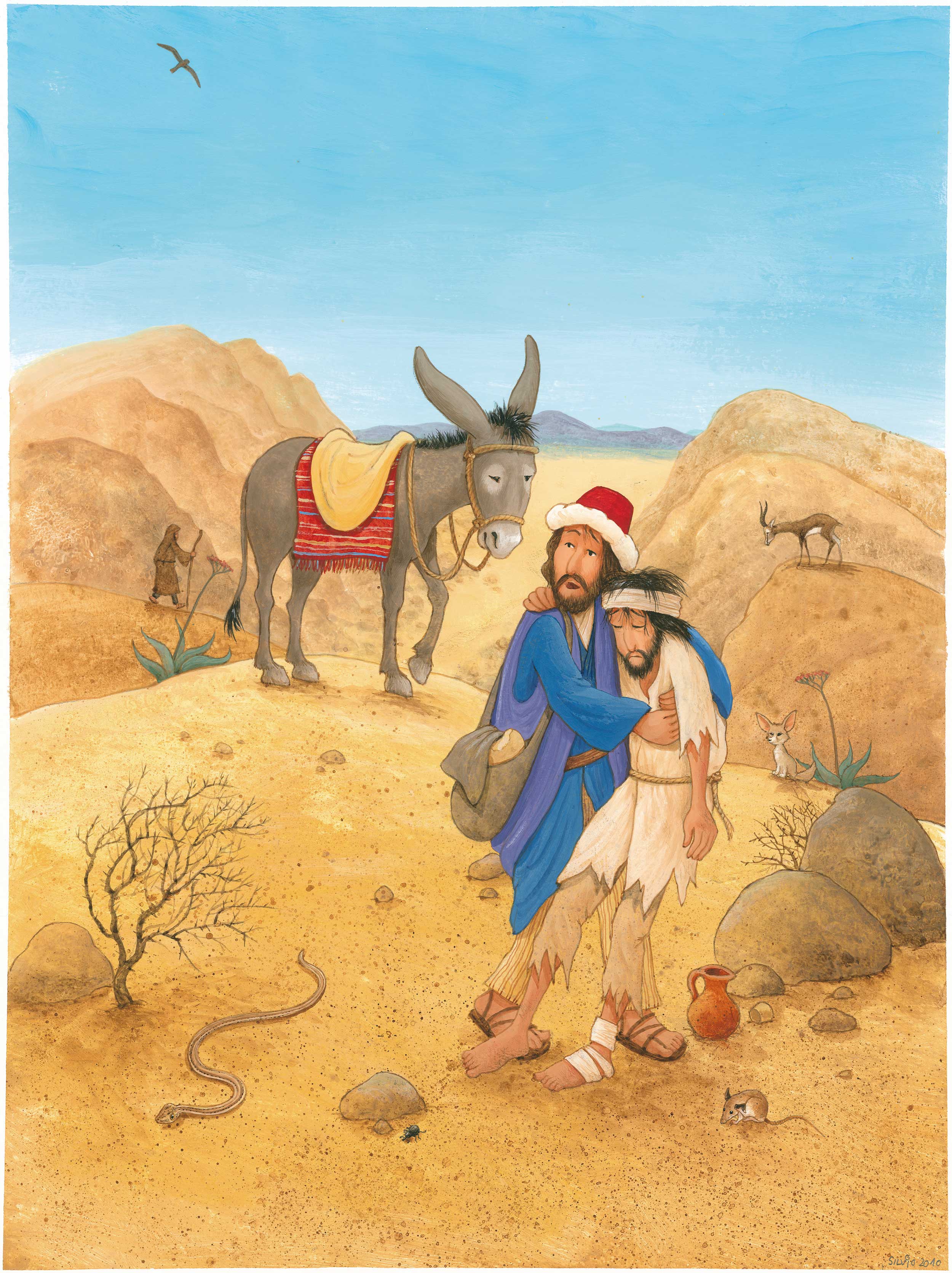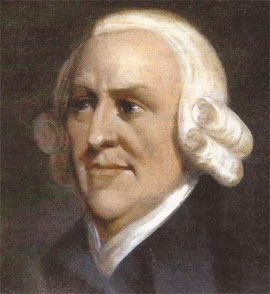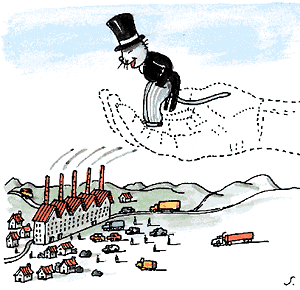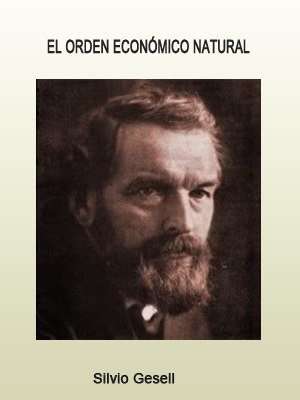Ökonomie und Wohlstand
Manchmal kommt es einem so vor als sei der Kapitalismus ein Naturgesetz. Als sei der Mensch dazu bestimmt, entweder andere Menschen auszubeuten oder ausgebeutet zu werden. Aber woher hat der Kapitalismus wirklich seine Existenzberechtigung ? Warum kommen wir nicht auf die Idee und stellen diesen Staat mithilfe des Grundgesetzes auf eine andere sozialorganisatorische Grundlage ?
 Der barmherzige Samariter
Der barmherzige Samariter
Man könnte meinen es hätte damit zu tun dass wir es uns nicht vorstellen können dass ein Mensch sozial handelt. Bei uns selbst angefangen. Das heisst, dass wir in unserer Annahme vom Menschen als Gattungswesen wie die Betriebs- und Volkwirtschaftler davon ausgehen dass dieses Wesen stets in erster Linie seinen eigenen Vorteil sucht. Dass es potenziell und faktisch unbegrenzte Bedürfnisse hat. Dass es keinerlei ethische oder ökologische Prinzipien gibt, die dieses Wesen innerlich daran hindern könnten, stets primär egoistisch determiniert zu agieren.
Wenn ich als Hauptmotivation des Menschen in der modernen Wirtschaftswissenschaft seinen Egoismus und seine Egozentrik sehe dann kann ich - "wirtschaftshistorisch" in Abgrenzung zu kollektiven Gesellschaften wie bei Jägern und Sammlern, der Wirtschaft des Mittelalters oder der Dorfgemeinschaft im alten Russland - zu der Annahme kommen, dass die heutige Gesellschaft der Endpunkt und Höhepunkt menschlicher Entwicklung sein muss, da in ihr das natürliche Wesen des Menschen als skrupellosem Egoisten so ziemlich prinzipientreu in der ökonomischen Organisation verwirklicht ist.
Das heisst also dass wir aus Sicht der klassischen Wirtschaftswissenschaft in der "Besten aller Welten" leben müssten. Das durch die Übereinstimmung von menschlicher Grundveranlagung und gesellschaftlicher Realität eigentlich der größtmögliche Wohlstand für alle Mitglieder der Gesellschaft generiert werden müsste. Das das "Menschsein" also ökonomisch gesehen zu seiner bestmöglichen Entfaltung kommen und sich ideal verwirklichen liesse.
 Adam Smith
Adam Smith
Doch sind angesichts der Diskrepanz zwischen der tatsächlichen ökonomischen Situation im beginnenden 21. Jahrhundert und dem Ideal neoliberaler Wissenschaftler wie Adam Smith, David Ricardo und Friedrich August von Hayek vom "allgemeinem Wohlstand der Völker" aufgrund von freien Märkten, freiem Handel und einem hohen Grad an Arbeitsteilung nach über 200 Jahren Kapitalismus hier nicht auch Ungereimtheiten erkennbar ? Deuten diese dann auf eine "mangelhafte" Wissenschaft hin oder eher auf eine mangelhafte Umsetzung neoliberaler Prinzipien in der Wirtschaftsorganisation bzw. Wirtschaftspolitik ?
Liegt es also an verblendeten Betriebs- und Volkswirten, die sich an Zahlen und Statistiken ergötzen ohne das Lebendige an ihrer Wissenschaft - Menschen mit auch ideellen Werten in einem organischen und limitierten Umfeld - mit einzukalkulieren so dass wir auf dem ökonomischen Auge für die Logik blind geworden sind ? Oder liegt es an der Wirtschaftspolitik die dem Markt zu wenig Raum gibt ? Die Rücksicht nehmen muss auf Gewerkschaften, Arbeitnehmerrechte und soziale Mindeststandards - das ganze Sozialgedöns halt ? Kurzum - auf die Menschen - so dass wir nicht in "allgemeinem Wohlstand" leben können.
Im ersteren Fall wäre es wohl ratsam nach einer Reform der Wirtschaftswissenschaften zu streben und in Richtung einer idealen alternativen Gesellschaftsordnung zu forschen. Vielleicht unter Einbeziehung der Marxschen Kritik am real existierenden Kapitalismus oder Silvio Gesells Entwurf von einer Natürlichen Ökonomie. Studieren könnte man auch wirtschaftspolitische Handlungsweisen, die sich statt am Profit einiger Weniger und der Existenz einer "Staatserhaltskaste" am Wohle aller Mitglieder der Gesellschaft orientieren. Wie in der Praxis von Transformationsländern wie Venezuela, Kuba, Nicaragua, Bolivien oder Ecuador. Oder auch bei noch natürlich wirtschaftenden Menschengruppen wie Klöstern, Kooperativen oder nichtzivilisatorischen Gemeinschaften.
 Fat Cat and Invisible Hand
Fat Cat and Invisible Hand
Sollte die Krisenanfälligkeit der Wirtschaft und das weitere Ausbleiben des allgemeinen Reichtums hingegen andererseits auf die Widerstände gegen neoliberale Politik in der Gesellschaft bzw. in deren nicht orthodoxer Anwendung zurückzuführen sein muss natürlich etwas komplett anders laufen. Dann wird ein verstärktes Pochen auf dem "Markt" als sinngebendes Ordnungsprinzip in der Wirtschaftswissenschaft und der Politik unter Einbeziehung auch eines veränderten Rollenverständnisses anderer wichtiger Protagonisten wie Arbeitgebern und Gewerkschaften notwendig sein, um die Bevölkerung dazu anzuhalten, weiteren "wohlstandsfördernden" neoliberalen Massnahmen zuzustimmen. Ist dies etwas schwerer, kann man "Reformen" ja mithilfe des Konstrukts "politischer Notwendigkeiten" und der neoliberalen Monstranz "Alternativlosigkeit" dem Volke step by step unterjubeln ( so wie dies z.B. in wirtschaftlich schwächeren Phasen guter Usus ist ). Um so dem Markt freiere Hand zu geben der ja alles eigentlich von allein zum Guten für alle regelt. Damit am Ende - für den einzelnen Bürger evt. zunächst nicht direkt ökonomisch fühlbar - für alle Mitglieder der Gesellschaft und alle die an Märchen glauben nun endlich dauerhafter und realer Wohlstand geschaffen wird.
( Die Möglichkeit dass der Mensch im Sinne einer solidarischen und verstärkt altruistischen Neuorientierung seines Wesens seine wirtschaftlichen Organisationsstrukturen selbsttätig und noch dazu bewusst verändert schliesst das neoliberale Denken nicht vollkommen aus. Es müsste dann wahrscheinlich nur eine Neubewertung der Antriebe des menschlichen Wesens in der klassischen Wirtschaftswissenschaft vornehmen um dieser Veränderung im menschlichen Verhalten Rechnung zu tragen und akademisch halbwegs authentisch zu bleiben. )
...
Beginnt Politisierung heute mit einer ökonomischen Alphabetisierung wenn die Politik so "ökonomisiert" worden ist ? Wenn selbstgeschaffene Sachzwänge und das Betteln nach Arbeitsplätzen die Politik bestimmen ?
Umdenken vom "Ich" zum "Wir" - geht das ?
zurück zur Artikelauswahl
Economy and Prosperity
Sometimes it seems that capitalism is rooted in the law of man's nature. As if man was made for either to exploit other people, or to be exploited. But where does capitalism really come from ? Why don´t we come up with the idea to change our countries to another social-organizational basis just using our very own law ?
One might think that it refers to the fact that we can not imagine that man acts socially. Beginning with ourselves. This means that we still believe in our perception of man as a species that is - like the economists don´t cease to preach - a being that is always looking for his own benefit in the first place. That it has potentially and practically unlimited needs. That there were no ethical nor ecological principles that could prevent this being to do that from inside so that it is determined for ever and always to act selfishly in first place.
If I regard man´s primary motivation as of selfishness and egocentricity like "modern" economists say, then I can - despite different historic examples of collective societies like hunters and gatherers, the economy of the Middle Ages or the village community in the old Russia - come to believe that today's society must be the end point and climax of human development, because in it the natural essence of man as an unscrupulous egoist is truly realized and mirrored in the economic organization.
In other words, we live - from the perspective of classical economics - in the "best of all worlds". That by compliance of basic predisposition and social reality we should actually generate the greatest possible wealth for all members of society. That "being human" should therefore find perfect conditions in economic terms and thus would let us all live a perfect life.
However, regarding the discrepancy between the actual economic situation of the world in the early 21st century and the ideal neoliberal of promised "wealth of Nations" by scholars like Adam Smith, David Ricardo and Friedrich August von Hayek on the basis of free markets, free trade and a high degree of division of labour after more than 200 years capitalism is there a little space for a little doubt on that theory ? Are these great holes between theory and reality then to be interpreted as a "poor" and unsufficient theoretical approach in our beloved science or rather a lack of implementation of neoliberal principles in business organization and economic policy?
Is it therefore either deluded economists, whose delight is in figures and statistics without the vivid experience of economical life - people with ideal values acting in an organic and limited environment - that we became blind to see some logic in economics ? Or is it that economic policy gives just too little space to the market? That it thus must take into consideration the arguments of trade unions, workers' rights and some minimum social standards - well - the whole useless social stuff or - in short : the people - so that we just cannot live in general welfare.
In the first mentioned case, it would probably be advisable to strive for a reform of economics and research towards an ideal alternative social order. Perhaps using Marx's critic on the actually existing capitalism or Silvio Gesell´s design of a natural economy. We could also study and discuss economic policy actions that concentrate on the benefit of all members of society and not only of the profit of a few and the existence of a "state-caste". As in the practice of transition countries such as Venezuela, Cuba, Nicaragua, Bolivia or Ecuador. Or see how economy works in non profit societies such as monasteries, cooperatives or in non-civilised societies.
If the vulnerability of the economy and the continued inexistence of general wealth, however be due to the resistance to neo-liberal policies in society or in its non-orthodox application some things of course must be run completely different. Then probably a stronger insistence on the "market" as the basic principle of order in what concerns economics and politics and a different role play of important protagonists in economy such as employer groups and trade unions will be necessary to persuade the population to furthergoing "wealth-creating" neo-liberal measures. If this proves too difficult to realize we could still "reform" the society towards the main goal general wealth using the construct of "political necessities" and the neoliberal monstrance "TINA" ( There is no Alternative ) to foist our good agenda step by step ( like it is happening when there is economical decline ). So to give free hand to the market. Thus at the end - possibly for the individual citizen at first not directly economically palpable -create finally permanent and real wealth for all members of society and those who still believe in fairy-tales.
( The possibility that humans change their economic organizational structures in the context of a conscious and intentional reorientation to solidarity and altruistic values is not completely incompatible with neoliberal theory. It would probably just need a re-evaluation of the drives of human nature in classical economics to take that inexpected change in human behaviour into account and thus remain academically authentic. )
Begins politicization today with a new economic literacy if the policy has been so "economized"? In a time when self-created constraints and people begging for jobs determine the policy?
Rethinking the "I" to "we" - is that possible ?
